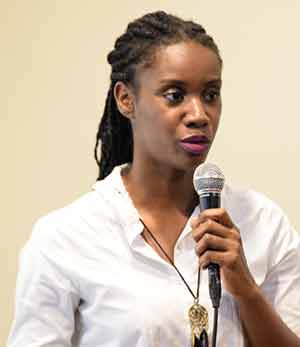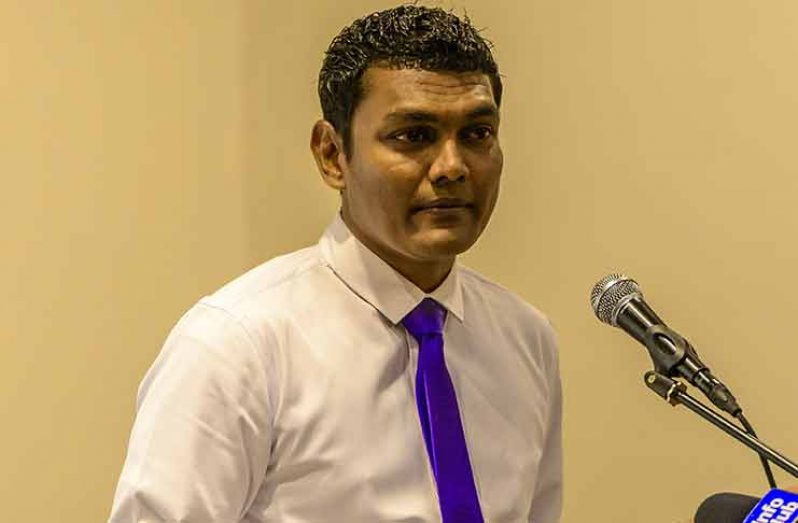… Private sector calls for feasibility study
THE local private sector is calling for a feasibility study to be conducted before the implementation of a ban on single-use plastic products here, as the Department of Environment kicked off a ‘National Conversation on Single-Use Plastics’ at the Herdmanston Lodge.

Private Sector Representative Ramesh Dookhoo, in his presentation, from the outset objected to the logo: “If you can’t reuse it, refuse it,” explaining that such a movement would “hurt” businesses that use plastic bottles in particular. He noted that manufacturers in Guyana are guided by the laws, and regulations established by the Environmental Protection Agency (EPA). Environment permits, he noted, cost millions of dollars yearly.
Dookhoo used the platform to call for a feasibility study to be conducted, contending that the answer is not to ban plastic bottles but rather to manage the use of plastic bottles, that there should be renewed efforts to recycle plastics that take five-10 years to biodegrade.
A white paper prepared by the Department of Environment on the proposed ban was presented in May to Cabinet, and, according to reports coming out of that meeting, the paper was well received.
On Tuesday, in commemoration of World Environment Day, which was observed under the theme ‘Beat Plastic Pollution’, the Department of Environment, in collaboration with the Environmental Protection Agency (EPA) held a ‘National Conversation on Single-Use Plastics’ at the Herdmanston Lodge, where members of the Government and Private Sectors were given a sneak peek of the proposed ban.
It is estimated that more than 8.3 billion tonnes of virgin plastic have been produced to date. According to Science Magazine, if current production and waste management trends continue, roughly 12 billion tonnes of plastic waste will be in landfills or the natural environment by 2050 and the negative impacts of such pollution are already being felt. It is estimated that 86 per cent of all sea turtle species, 44 per cent of all seabird species and 43 per cent of all marine mammal species are being affected.

Some 500 billion plastic bags are used on a yearly basis, with one million sold every day and 20,000 every second. To ensure Guyana plays its part by assisting with the reduction of plastic pollution worldwide, the Department of Environment is proposing a ban on the importation, manufacture, sale and use of single-use plastic bags and other single-use plastic products including plastic plates, cups, and utensils.
“The Institute for European Environmental Policy defines single-use plastic as any disposal plastic item which is designed to be used only once; but for the purpose of the proposed ban we further added that single-use plastic products are those that are less than 35 microns thick, they are made of polyethylene, they are environmentally persistent and have low to no recycling potential,” the Department of Environment Stakeholder Management Coordinator Aretha Forde explained.
FOSSIL FUELS
In justifying the proposed ban, Forde explained that single-use plastic products are made from fossil , which act as a detriment to the environment, adding that they leave a huge carbon footprint.
“They are environmentally persistent, only a fraction of single-use plastic can be recycled and of course when not disposed of properly they leach harmful chemicals which can then cause disruptions in body function and of course they pollute our oceans killing more than 100,000 marine animals every year,” she further explained.
Zooming closer to home, Forde said in the Municipality of Georgetown alone, 180 tonnes of solid waste is generated daily with single-use plastic products accounting for 10 per cent of the waste stream. While a white paper on the proposed ban has been presented to Cabinet, Forde said it simply set the foundation for National Consultations of which the National Conversation is just the start.
Subsequent to the consultations, the regulation would be drafted allowing for the development of standards and alternatives, the inclusion of proposed fiscal incentives and imposition of environmental levy before the ban takes effect.
Already there are a number of eco-friendly alternatives to single-use plastic products such as the use and sale of cloth bags, bamboo utensils and paper plates and/or boxes. It was noted that while the department has already engaged a number of supermarkets, the discussion would be taken to the marketplaces.
In addition to the proposed ban, Forde disclosed that an invitation was extended by UN Environment Programme for Guyana to sign unto the Clean Seas Campaign.
In addition to the presentation by Forde, the National Conversation also took the form of a panel discussion. The Mayor and City Council (M&CC) Director of Solid Waste, Walter Narine, urged both the public and private sectors to become the vehicles of change as he, like Forde, painted a vivid picture of the dangers the indiscriminate use of single-use plastic have on society.
“Single-use plastics are used so widely, there is a massive island of plastic three times the size of France currently floating between California and Hawaii. It gets worse, 83 per cent of our tap water contains these particles and its toxic chemicals can be found in our blood stream,” Narine explained, adding that these plastics are threatening the world’s ecosystem.
“Earth is not a single-use plastic planet, and your action, my actions can make a difference,” he said, calling on all Guyanese to endorse the proposed ban.
IMPACT ON MARINE LIFE
Conservationist and Head of Guyana Marine Turtle Conservation Society Annette Arjoon-Martins, who also sat as a panellist, said she experienced firsthand the negative impact plastic pollution has had on marine life, during her 20 years of work at Shell Beach.
Arjoon-Martins said when she started working at Shell Beach 20 years ago; coconut husk was the single debris that was a major concern due to the problems it caused for the turtles.
However, she said plastic pollution some years later became a major problem with many sea turtles dying as a result. Sea turtles, she explained, at times mistakenly take plastics for jelly fish.



.jpg)









